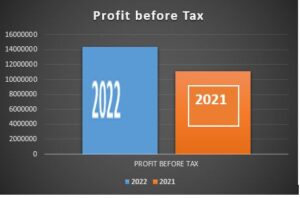- posts highest profit of GH¢4m in the rural banking sector
- climaxes 40th anniversary celebration
The Fiaseman Rural Bank PLC at Bogoso in the Prestea Huni-Valley district of the Western Region has posted yet another remarkable growth in all financial indicators for the 2022 year under review.
Operational Performance
The bank has posted an impressive pre-tax profit of a little over GH¢14.4million, a remarkable growth of approximately GH¢3.5million compared to about GH¢11million recorded in 2021; representing a growth of 29.72 percent, the highest recorded in the rural banking sector so far. This significant profit was a result of the board, management and staff’s shrewd leadership style to ensure better returns for all stakeholders.
The bank recorded Total Deposits of GH¢308.3million, representing a percentage increase of 48.03% from approximately GH¢208.2million in 2021 – with Total Assets of the bank hitting GH¢351.2million compared to the previous year at about GH¢240.7million, which represents a percentage growth of 46.19 percent.
Total Loans and Advances for the period under review also moved up, by 29.1 percent from approximately GH¢86.4million in 2021 to about GH¢111.6million in 2022.
The bank’s Stated Capital stood at GH¢5.3million at end-December 2022, which is about 400% above the regulatory requirement of GH¢1million. Meanwhile shareholders have further been urged to buy more shares and enjoy the benefits of investments in the coming years.
The board, as well as management of the bank, was confident about the year under review because of other opportunities for sustainable growth were explored and the team’s commitment to be innovative and distinguished in service delivery, despite government’s Domestic Debt Exchange Programme and its effects on the banking industry.
Chairman-Board of Directors, Dr. Anthony Sarpong, announced these and more at the bank’s 34th Annual General Meeting of shareholders, which also climaxed the bank’s 40th anniversary celebration held last Saturday at Bogoso in the Western Region.
Operational Environment
According to the Chairman, Ghana’s economy entered a full-blown macro-economic crisis in 2022 on the back of pre-existing imbalances and external shocks.
Large financial needs and tightening financing conditions exacerbated debt sustainability concerns, shutting off Ghana from the international market.
Large capital outflow combined with monetary policy tightening in advanced economies put significant pressure on the exchange rate, together with monetary financing of the budget deficit resulting in high inflation of 54.1%.
These developments interrupted the economy’s post COVID-19 recovery, as GDP growth declined from 5.1% in 2021 to 3.1% in 2022. The 2022 fiscal deficit was well above target at 11.30%. Public debt rose from 79.6% in 2021 to over 90% of GDP in 2022, as debt-service revenue reached 117.6 %.
Rural Banking Industry
The rural banking sub-sector recorded some improvements in the year under review. Profit Before Tax grew by 44.8% to GH¢164.0million as of December 2022 from GH¢113.3million recorded in December 2021.
Total Assets also grew by GH¢25.6% from GH¢6.7billion to GH¢8.4billion as at December 2022.
Deposits also rose, by 25.4% from GH¢5.9billion in December, 2021 to GH¢7.4billion. Loans and advances grew by 18.2% from GH¢2.2billion to GH¢2.6billion.
Further, capital adequacy ratio (CAR) and non-performing loans (NPL) worsened marginally from 9.9% and 10.8% in December 2021 to 10.7% and 11.2% in December 2022. He emphasised that RCBs participating in the government of Ghana DDEP programme have aggregated the effects of their unresolved locked up funds with some Securities and Exchange Commission (SEC)-regulated institutions.
RCBs held significant funds in government related bonds, which have been estranged for new bonds under the DDEP. The Board Chairman has therefore called on government to release the locked-up funds for sustainability of the rural banking sub-sector.
Dividend
With this impressive performance for the year under review, and the fact that the bank’s reserves have increased over the past year, the Board is determined to declare and pay good dividends to its cherished shareholders.
In spite of the Bank of Ghana’s regulatory directive that it will not allow banks and Special Deposit-Taking Institutions to declare and pay dividends for the 2022 financial year, directors of the bank put in all efforts to get dividend paid to shareholders – but had the request turned down.
Corporate Social Responsibility
The bank continues to support communities, individuals and institutions within its catchment areas. A total amount of GH¢163,518 was spent on donations and Corporate Social Responsibility in areas of Agriculture, Education, Health, Security and Recreation to deepen the bank’s commitment to societal responsibility.
Future Outlook
Dr. Sarpong maintained that looking at the significant role the bank is playing in the rural banking sub-sector, it is incumbent upon the board and management to maintain momentum so as not to be overtaken by events.
The Board is poised to invest in its human capital, since every sustainable business thrives on well-trained human resources.
Also, he stressed that the Board will adequately resource management to deepen its intention of serving the bank’s esteemed customers with state-of-the-art technology – given the banking industry’s digitisation process.
He hinted that the bank is collaborating with ARB Apex Bank PLC to take advantage of a Mobile and Agency Banking Application that will take off in the fourth quarter of 2023.
In view of this, customers of the bank have been urged to take advantage of these new developments when they are rolled out.
Chief Executive Officer of the Bank, Godfred Frank Opoku, in an interview with Business & Financial Times said the bank’s business focus in 2023 is on driving growth, innovations, efficiency and service as the main pillars in achieving profitability.
He has stressed that the bank will follow stringent cost-reduction policies, strengthen internal control measures and develop the human capital to meet demands of functioning profitability, as well as achieving the objective of overcoming shocks from the unfriendly macroeconomy and rising cost of living with their devastating effects.











